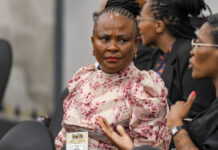Johannesburg – South Africa is finalising the much-anticipated Hydrogen Society Roadmap as the country shapes its industrialisation and economic pathway.
This development was recently outlined by the Department of Science and Innovation’s (DSI) Chief Director for Hydrogen and Energy, Dr Rebecca Maserumule.
Crafting the document began last year and is expected to be finalised in the next three months.
Dr Maserumule outlined this during a webinar on the future of alternative energy sources.
“We think that around this transition, the lynchpin is hydrogen – that is with prior emphasis on green hydrogen. The emphasis of the roadmap really is how do we, as South Africa, try to find insights in the expectations and purposes towards how we should make this movement?”
The roadmap is a collaborative roundtable of which all relevant stakeholders are at equal footing and the issues of gender equality and social inclusion are at the forefront.
These revolve around how the energy sector would contribute towards the country’s efforts in building an inclusive economy while “making sure that we reduce poverty and inequality while moving towards a sustainable future for South Africa.”
This considers stakeholder benefits such as job creation, economic growth and development, industrialisation or the sustainable industrialisation contribution towards energy security.
“The growth areas for the sector are around energy in the mining sector, transport industry, buildings, [and the] export of green hydrogens to other economies (either Europe or Asia) in resource development,” says the Chief Director.
For South Africa, industrialisation is an important ideal.
“That is an aspiration that we have as a country. We are building our economic growth out of COVID on the back of infrastructure development. In order to do that effectively, while keeping to our Paris Agreement commitments, we really need to maximise system value.”
She adds that at the core of maximising system value is the expansion of renewable energy. Addressing issues around energy efficiency, and grid system upgrade interventions are central to successfully achieving this.
“This plays into transforming the energy system. This is looking at power in market reforms,” she says while also mentioning the unbundling of power utility Eskom which is currently underway.
In making its decisions, South Africa is also in part informed by developments globally.
Therefore, she says, it is critical for South Africa to have “honest and frank” discussions and intentions about the electrification of sectors on the back of renewables.
Key among the questions to be asked is whether the transition will be conducted effectively.
“How do we go from what we call ‘gray’, which is hydrogen producing coal and natural gas, to ‘blue’, which is hydrogen which is gray that allows carbon caption or carbon storage and lastly, ‘green’ hydrogen, which is on the back of renewables?” she remarks.
Even though it is often cited as expensive, the price of renewables is coming down.
Dr Maserumule is adamant that “the green hydrogen revolution [should happen] here sooner versus later”.
“Most international energy agencies say we are not going to move towards greenhouse gas emission reductions without carbon caption and storage (CCS) of which South Africa has had programs since around 2010.”
The roadmap also addresses this issue, among others.
Regulations
She says government’s role in “most cases is to put in place policy regulations”.
“Investments are coming from government and the private sector, especially if you’re coming up with sustainable options as well as education and skills capacity, which is critical in ensuring that there is proper awareness towards this movement.”
She spoke of the need for renewables to extend outside the power sector adding that “we need to create a future in which renewables can play a role.”
Hydrogen could be used for rail tracks and maritime shipping, she says, adding that the country needs to increase the share of renewables in the current energy mix.
“We have the conditions from an economic point of view to make it happen, sooner versus later,” she said.
Nuclear
Meanwhile, Managing Director of the Nuclear Industry Association of South Africa (NAISA), Knox Msebenzi said many African countries are pursuing nuclear power which offers several benefits.
The association is a body that is committed to promoting the highest standards in the development and application of nuclear technology in South Africa.
“They are building in Egypt and a few other countries,” he says, adding that Nigeria has also expressed interest in nuclear.
South Africa already has a nuclear power plant – the Koeberg power plant. The plant which is located in Cape Town, was commissioned by the former government in 1984.
He says nuclear technology is not “new” with the world’s first nuclear power plant having being commissioned in 1954 in the Soviet Union.
“So, it cannot be an alternative energy source in the true sense of new technology – it has been around for a very long time. If you look at the world outlook, in 1986, Chernobyl happened and Fukushima also happened. Those two events were actually a temporary setback in the movement …where countries took a step back and reassessed the situation.”
He adds that there are about 30 emerging countries around the world that are planning or starting to build nuclear power plants.
“Major world countries have this technology; all our BRICS [Brazil, Russia, India, China and South Africa] partners have got a huge interest in nuclear.”
Chief among the benefits of nuclear is that it is a carbon-free base power and requires no back-up. In addition, nuclear power plants provide employment.
“If you say a power plant takes five years to build, in those five years, there is reasonable employment. People are not just twiddling their thumbs, they are actually involved in welding, bricklaying, excavation – that is actually the creator of employment, that’s where the money goes,” he says.
The costs associated with nuclear technology are “relatively low and predictable.”
He notes that the initial construction costs of a nuclear power plant are high, adding that proper cost of funding should be made.
“The normal funding – through which the banks make a lot of money on interest – may not be ideal. This is why you’ve got the BRICS Bank, you’ve got the World Bank, and so forth, that have got favourable rates for infrastructure projects.
“Nuclear power plants are environmentally friendly. There’s a lot of talk about nuclear waste but that is something that is managed very well. It emits no gases, and to that extent, it is clean.”
While some countries had experienced challenges with nuclear technology like the Fukushima incident whereby the Japanese nuclear plant was struck by an earthquake and a tsunami in 2011, there is benefit to the technology.
“Yes, something happened to the plant that led to Japan closing all their nuclear plants but they have since been opening them one-by-one and they are going back full steam because they realise they cannot be sustainable without nuclear. For a country that suffered misfortune to say the risks are outweighed by the benefits, it tells you a good story,” says Msebenzi.
–SAnews.gov.za
Follow @SundayWorldZA on Twitter and @sundayworldza on Instagram, or like our Facebook Page, Sunday World, by clicking here for the latest breaking news in South Africa. To Subscribe to Sunday World, click here.
Sunday World





